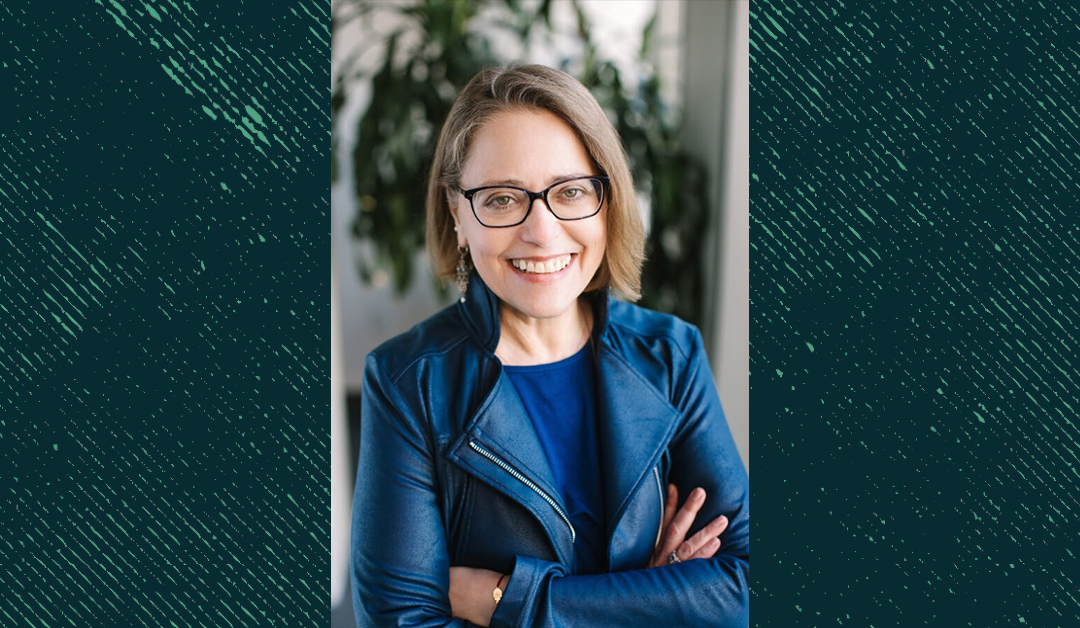Amy Rutstein-Riley, PhD, was appointed Dean of Antioch University’s Graduate School of Leadership and Change last July, bringing with her a deep appreciation for what she calls “the creative genius that went into building this foundation.” As she nears the end of her first year leading this vibrant academic community, she describes Graduate School of Leadership and Change (GSLC) as a “school of riches,” where intellectual curiosity, creativity, academic rigor, and social justice values converge.
With such a strong foundation in place, Rutstein-Riley is excited to seize the “tremendous opportunities” ahead to further develop the school, respond to students’ evolving needs, and adapt to an ever-changing educational landscape. Her long and wide-ranging experience as an academic and leader has equipped her to guide the GSLC. From leadership roles at Lesley University to her professional identity as a scholar-practitioner, Rutstein-Riley’s career has been rooted in a passion for collaborative, project-based learning. She sees a clear continuity between her past work and her new role, allowing her to drive the GSLC’s mission forward with both vision, purpose, and unity.
A Focus on Building Programs with Purpose
Rutstein-Riley’s career reflects a deep commitment to both leadership and learning, underscored by a passion for creating environments where people can grow—both individually and collectively. Her journey began at Bay State College, where she spent nine years as a full-time professor in the social sciences. But it was her work beyond the classroom that truly defined that chapter. Rutstein-Riley proposed and led the creation of a counseling center, a project that stemmed from a mentorship with Nancy Geoffrion, the college’s Vice President of Academic Affairs. Geoffrion saw Rutstein-Riley’s potential and provided her with the opportunity to bring her vision to life. “Nancy gave me so many opportunities to create something new,” she says. The counseling center not only met a significant need for the students but was also, for Rutstein-Riley, a profound experience of growth. As she says, “It was growth-fostering for the school, but equally, if not more so, for me.”
The success of that project paved the way for her next role at Massachusetts General Hospital, a renowned teaching hospital affiliated with Harvard Medical School. There, Rutstein-Riley was recruited to help establish a new graduate program in clinical research. She was named Associate Director and worked alongside a practicing physician to teach research ethics and develop specialized curricula for physicians across different clinical fields. This role expanded her interdisciplinary approach to education, allowing her to work across various domains of health and research. “It was a rich experience, and I stayed for nine years,” she says, “building curricula and collaborating with a wide range of healthcare professionals.”
However, Rutstein-Riley’s own academic journey was just beginning. During her time at Massachusetts General Hospital, she realized that while public health was fundamental to her identity, her true passion lay in an interdisciplinary approach that bridged various fields of knowledge. This realization led her to pursue a PhD at Lesley University, where she found a program that would expand her thinking and fuel her creativity. “It opened up my thinking, opened up the way I think about teaching and learning,” she says. “It offered me a tremendous opportunity to be creative and generative.”
After earning her PhD, Rutstein-Riley joined the faculty at Lesley University, where she had the chance to further explore her research interests, particularly in the area of girls’ and women’s development and health. One of the projects closest to her heart was the Girlhood Project—a community-based initiative that brought middle and high school girls from the Greater Boston area to the Lesley campus. This program provided a space for young women to explore complex issues such as race, class, identity, gender, and sexuality—issues they often had no safe place to discuss. “I wanted to create a space where they could interrogate these issues in a safe and comfortable way,” she explains.
The Girlhood Project became a defining part of her work at Lesley, running for 16 years and involving both college and graduate students in the co-construction of the program. “The girls and the college students themselves co-constructed the space,” Rutstein-Riley says. “I was the expert, but I really defaulted to being the ‘guide by the side,’ preparing the university students to work in partnership with the girls.” The project allowed students to use various modalities—such as film, writing, and dance—to engage with the material, emphasizing collaboration and shared leadership. Many of her students went on to present papers at the National Women’s Studies Association and other professional conferences, further enriching their academic journeys.
Engagement in Relational Leading and Learning
Rutstein-Riley’s career at Lesley also saw her take on increasingly significant leadership roles, including Director of the PhD Specialization in Adult Learning and Development, Dean of the Faculty, Chair of the PhD in Education Studies, and Associate Provost of Academic Affairs. However, despite her administrative success, Rutstein-Riley began to feel a longing for more direct engagement with students. “I started to recognize that absence and wondered if I would continue in the field if I didn’t get back to students,” she says. That realization led her to apply for the position of Director of the PhD in Leadership and Change at Antioch University, a position that aligned with her progressive educational values. “I had always known about Antioch because there are so many similarities between Antioch and Lesley in terms of constructivist, progressive educational paradigms,” she explains.
Her passion for Antioch’s mission became even clearer as she moved into the role of Dean of the Graduate School of Leadership and Change (GSLC). From the very beginning, she knew Antioch was the right place for her. “I feel so honored to be able to lead this school,” Rutstein-Riley says. “When I got here, I thought, ‘This is just a tremendous gift,’” she reflects. “No wonder the students I met really felt transformed by their experience in the GSLC.” She was equally inspired by the faculty, whom she describes as “an enormously committed group of scholars who care deeply about mentoring and relational teaching as am I.” As she puts it, “It’s exciting to land among kindred spirits.”
Forward Thinking Commitment
Since joining Antioch, Rutstein-Riley has already set in motion several transformative changes at GSLC. An early challenge and opportunity came when the GSLC welcomed a new cohort of 87 students, whose PhD program had dissolved along with the rest of the Union Institute. “The MOU was signed on December 23,” Rutstein-Riley explains, “and by March 1, we had launched a brand-new doctoral program with 87 students.” This rapid expansion required swiftly hiring three new full-time faculty members from the former Union Institute and bringing other faculty on board as affiliates.
She has worked to broaden the GSLC’s scope, most notably by integrating the Graduate Management Programs—Antioch’s MBA, Master of Human Services Administration, and MA in Nonprofit Management—into the school. These programs, which had operated independently, are now part of the GSLC umbrella, fostering new opportunities for synergy, innovation, and cross-disciplinary collaboration. We are already seeing the positive impact of this organizational shift, with increased collaboration between departments, enhanced learning experiences, and a more unified approach to addressing complex societal challenges.
One of her most exciting initiatives is focused on continuing to define the GSLC’s role within the Coalition for the Common Good, an emerging partnership of mission-aligned colleges and universities founded by Antioch University and Otterbein University. While these conversations are still in their early stages, Rutstein-Riley is already exploring key questions highlighting educational opportunities that can foster growth for current and future Coalition members and the communities they serve along with envisioning the creation of professional development opportunities across the Coalition to build pathways that lead students into programs, expanding the impact of our shared mission. Although much remains to be decided, Rutstein-Riley is optimistic. “Stay tuned,” she says. “I’m still at the beginning of that process, but I find it incredibly exciting. For independent, tuition-dependent institutions, this model is something that schools will need to look towards in the future. It’s a creative, forward-thinking approach.”
Growth Fostering Innovation
Ultimately, much of Rutstein-Riley’s work as Dean centers around supporting her faculty, ensuring that their teaching and mentoring continue to inspire and equip students with the tools they need to succeed. She is deeply involved in addressing the evolving needs of students, creating an environment where they feel heard, supported, and empowered to engage in the rigorous academic and personal development that defines Antioch’s educational philosophy. This is particularly critical as she oversees the day-to-day operations of a program that not only provides a transformative learning experience but also shapes the leaders of tomorrow.
Rutstein-Riley is keenly aware of the immense responsibility that comes with this role. The leadership cultivated at GSLC is not just about academic success; it’s about developing a generation of leaders who will be equipped to navigate and challenge the complexities of an increasingly interconnected world. For her, the goal is clear: to prepare students to lead with empathy, vision, and the ethical grounding necessary to make meaningful, lasting changes in their communities and beyond.
“The world desperately needs leaders who are caring—leaders driven by purpose and passion,” Rutstein-Riley stresses. “We need individuals who can respond to societal challenges with creativity, compassion, and a deep commitment to justice.” Under her leadership, the GSLC’s focus is on continuing to create an educational space where these qualities can flourish, and where students are empowered to use their skills and knowledge to advocate for positive change.
As Rutstein-Riley reflects on the work she’s doing, it becomes evident that her vision for leadership goes beyond traditional models. She sees leadership as a force for social good, one that is rooted in community engagement, transformative relationships, and an unwavering commitment to equity. “That’s what we’re striving to cultivate here,” she concludes. “Not just leaders in name, but leaders who have the courage to act and the conviction to drive meaningful social change.”





